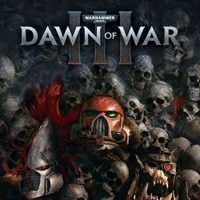Dawn of War 3: Elite points and elite units
Elite units and the mechanic standing behind them is a complete novelty in the latest installment of the Warhammer 40,000: Dawn of War franchise. In the previous titles, the player had access to hero units. In Dawn of War III it's still here, but the mechanic changed severely. There are two reasons for that - the necessity to select which units you will be able to use before the match starts and the resources required to call them.
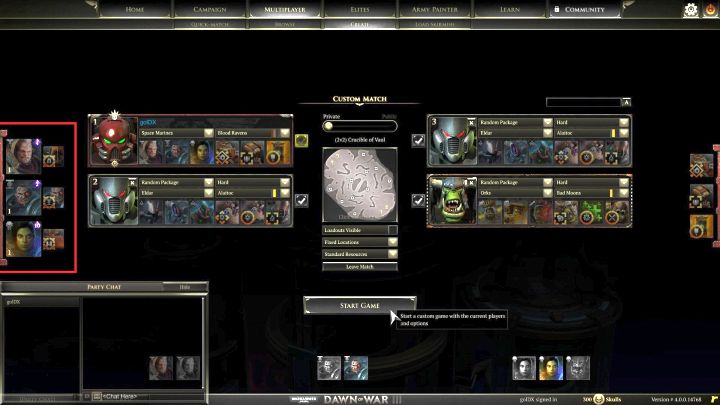
Elite units are divided into one of the five roles, such as:
- Assassin - Assassin deal higher damage than most of the elites, are capable of swiftly moving around the battlefield and, quite often, teleporting from one place to another. Increased mobility and damage output come at a price - those elites are extremely vulnerable to attacks. They are perfectly suited for quick elimination and hit & run tactics.
- Crowd Control - elite units from this group have abilities that can silence, stun or displace enemies and some of those abilities can target whole groups of troops and deal area of effect damage. Those units are mostly used to disrupt enemy forces and annoy other players - thanks to them you will weaken or even disable enemy units for a short while, giving you an edge over them. However, duration times of those abilities are short and the Crowd Control elite units aren't suited for combat, losing to most regular units on the battlefield.
- Nuker - elite unit from this group have access to extremely powerful abilities that are capable of devastating single units, as well as entire groups of enemies. Nukers are similar to Assassins, as they are focused on dealing immense damage in a short amount of time. However, they are more effective against larger groups of enemies and weaker when fighting with single, powerful foes.
- Support - elite units from this group have access to abilities that are used to support allied units. They can heal, create shields or even teleport allied troops from one place to another. They are the exact opposite of the Crow Control elite units - instead of disrupting enemy units, they are focused around helping their allies. Similarly to the mentioned Crowd Control units, Support ones aren't suited for direct combat, as they are weaker than most units in the game.
- Tank - units from this group are characterized by immense durability, making it extremely difficult to take them down. They often have abilities that allow them to heal themselves or block enemy attacks directed at them. They are very effective at harassing enemies and limiting their usefulness - they are capable of, quite literally, sticking to an enemy unit or group of units and deal constant damage. Tank elites are effective against almost every unit groups in the game, however they aren't as good against powerful ranged squads.
What is more, in most cases elite units belong to more than a single group. Elites from the Tank group are often extremely good at Crowd Controlling, Assassins often have the capabilities of Nukers and so on.
The summoning process of an elite unit is trivial - you just need to click on the unit portrait located at the left corner of the screen (or press F1-F3 button) and select the place you want the elite to spawn at. However, before you can do that, you must first make sure that the elite unit will be available during the game. During the singleplayer campaign, the game will force you to use specific elite units, but in the multiplayer you will have full control over the units you want to have in your army. Each player can have up to 3 elite units in their roster. Those can be customized from the Elite Units menu (this can be accessed from the main menu of the game, by clicking the adequate button located at the top of the screen) or after you've joined the game. In the latter case, the currently selected elite units can be checked by looking at the left corner of the screen. By clicking their portraits you will be able to change the elite unit or customize it.
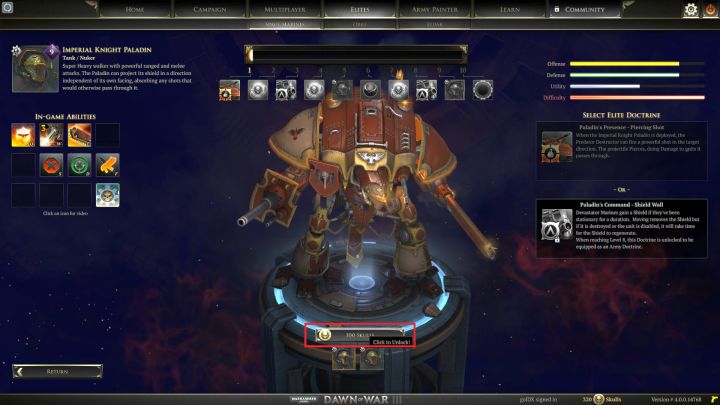
The second problem is the fact that you must unlock the unit before it can be used. By default, each player will have access to three elite units from each faction. One of them is a "leader" of the faction (the hero you will use during the campaign - Gabriel Angelos for Space Marines, Macha for Eldars and Gorgutz for Orks) and another one is the most expensive elite unit you can recruit, also being one of the strongest units in the entire game. There are additional elite units available for each faction. Some of them are simply enhanced versions of normal units you are able to recruit (like, for instance, a ranged Dreadnought), whereas the rest are unique characters, similar to heroes you can find in Warcraft III. Finally, new elite units can be unlocked by using Skulls, an in-game currency that's used for that purpose (as well as to unlock new doctrines). The amount of Skulls you have can be checked by looking at the bottom right corner of the screen (their acquisition method is discussed in a separate chapter).
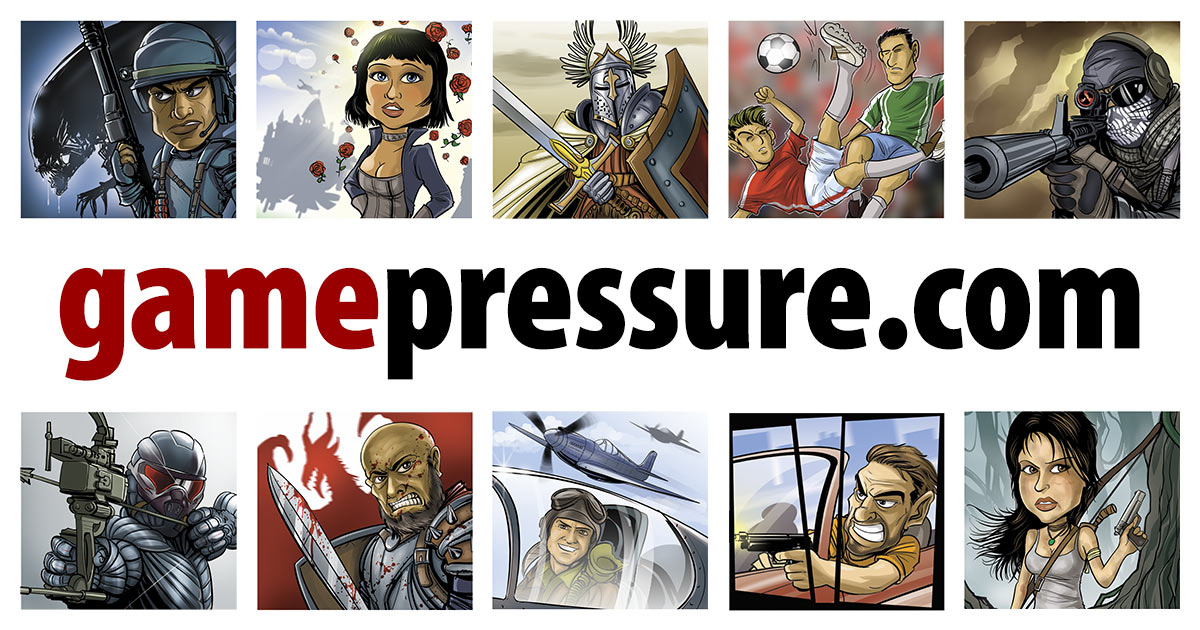
Once you've unlocked and selected elite units you want to use in combat, you need to get into the game and call them. However, it's not that simple - you will need a specific amount of elite points to be able to do that. The amount you already have, as well as the time needed to create more elite points can be checked by hovering over the purple icon in the lower left corner of the screen. By default, each player gains one elite point every 120 seconds. This amount can be increased by capturing and building an elite point generator on top of a resource point - this will decrease the time from 120 to 90 seconds.
Elite points are generated from the beginning of the game. If your unit requires, for instance, 3 points, you will be able to summon it after 360 seconds, when the game reaches 6th minute. The amount of points you will be able to accumulate is proportional to the length of the game. The longer it lasts, the more points you will be able to accumulate, allowing you to summon more powerful elite units. However, this works both ways - shorter matches won't allow you to summon very expensive units. Elite units should be selected differently for each match, depending on whether you're playing on a 1vs1, 2vs3 or 3vs3 map and you need to anticipate their length, at least to some extent. You shouldn't take the cheapest ones, because an enemy with stronger elite units will eventually be too strong for you to handle, but there's also no point to use the most expensive ones, requiring you to play over 50 minutes to accumulate enough elite points.
Follow those rules when it comes to unit selection:
- 1vs1 matches - those last up to 20 minutes. They allow you to generate 10-12 elite points, there's no point to exceed this number when selecting your elite units.
- 2vs2 matches - those typically last from 20 to 30 minutes, allowing you to generate 10-20 elite points and giving you more freedom in unit selection.
- 3vs3 matches - those often last longer than 30 minutes, especially if more experienced players are in the game. They will allow you to easily generate more than 20 elite points - using the most expensive elite units in this case can be beneficial.
Those values can differ slightly, as there's no rule. Generally speaking, however, you should stick to it, because in most cases, when the enemies aren't sitting in their bases or aren't overly aggressive, those matches should look like that.
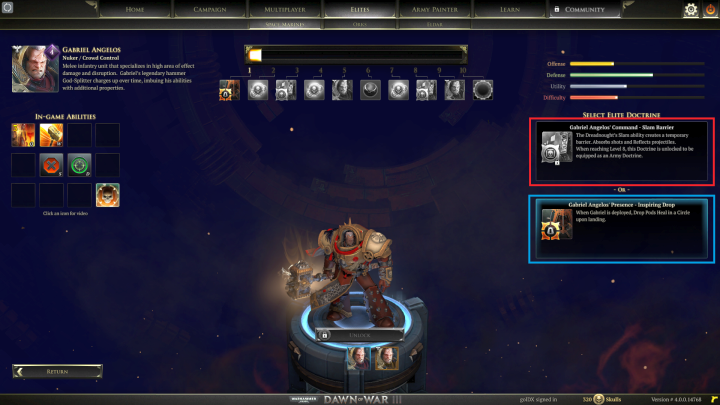
Last thing worth mentioning when it comes to elite units are the unique doctrines that they bring to the battlefield. Those are divided into two groups - Command Doctrines and Presence Doctrines. The former are active when the elite unit is in the roster - you don't even need to summon it to the battlefield. The latter are active once the elite unit is deployed to the battlefield. Presence Doctrines are, in most cases, stronger and offer greater benefits. What is more, Command Doctrines can be unlocked as an army doctrine (more on that in a separate chapter), once you advance a specific elite unit to level 8.
Finally, you should remember about the following:
- Proper elite unit selection. You should chose elite units that supplement your playstyle. If you like to attack your enemies with overwhelmingly large armies, there's no point to invest in mobile elite units specializing in hit & run tactics.
- Remembering about elite point costs of the units. Each elite unit has its own deployment cost (from 2 to 10) and the amount of elite points you will have depends on the length of the game.
- When an elite unit dies in battle, you will need to wait for some time before it can be deployed again. Redeployment is completely free (you don't have to use elite points again), but with each death the elite unit will need more time to respawn.
- Most of the elite units can be summoned near your (or your allies') base, or near a resource point controlled by your team.
- Sometimes it's worth to refrain from deploying cheaper elite units to the battlefield to be able to summon a more expensive ones. In most cases you won't have the luxury to do so, but sudden deployment of a 9 or 10 point elite can change the outcome of the entire match.
You are not permitted to copy any image, text or info from this page. This site is not associated with and/or endorsed by the developers and the publishers. All logos and images are copyrighted by their respective owners.
Copyright © 2000 - 2025 Webedia Polska SA for gamepressure.com, unofficial game guides, walkthroughs, secrets, game tips, maps & strategies for top games.
